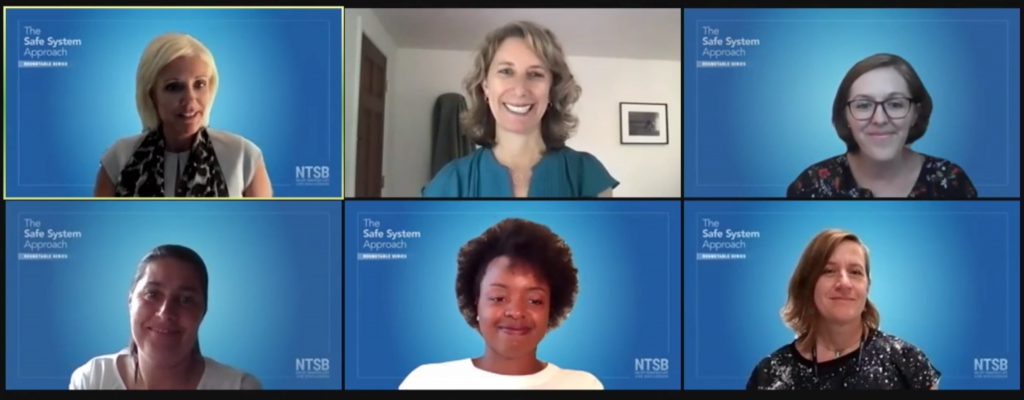Systems spotlight: CSCRS promotes Safe Systems dialogues in Summer Learning Series
In July, CSCRS launched its Safe Systems Summer Learning Series. This series of free virtual events has brought together panelists with diverse perspectives to reflect on core Safe Systems concepts and the broader system in which our transportation work unfolds. The final session in this series will be Change Management Tools for Safe System Implementation, on Friday, August 27. Details on this session:
Time: 1 – 2:30 PM

Becky Naumann, Steve Orton, and Keshia Pollack Porter
Description: As communities seek to adopt more Safe Systems oriented approaches, they are likely to experience policy feedback and unanticipated outcomes. In this session, we explore how communities can equip themselves with more integrated data, adaptive leadership methods, and systems-oriented tools to help them evaluate and better manage the change process.
Panelists:
- Becky Naumann, Core Faculty at the Injury Prevention Research Center and Assistant Research Professor of Epidemiology, UNC Chapel Hill
- Steve Orton, Senior Fellow at North Carolina Institute for Public Health and Adjunct Assistant Professor of Health Policy and Management, UNC Chapel Hill
- Keshia Pollack Porter, Professor of Public Health and Vice Dean for Faculty, Johns Hopkins University
Moderator: Kelly Evenson, Professor of Epidemiology, UNC Chapel Hill
Miss one of the previous sessions? Here are links to the recordings:
- Redefining Safety, July 16, 2021
- What Lies Beneath “Human Error”? July 23, 2021
- Redesigning the System to Support Safety, July 30, 2021
- Broadening the Toolbox for Kinetic Energy Management, August 6, 2021
- Redistributing Responsibility for Safety, August 13, 2021
See the series website for additional information.
 CSCRS-hosted NaTMEC 2021 brings record attendance to virtual format
CSCRS-hosted NaTMEC 2021 brings record attendance to virtual format
In June, CSCRS hosted the National Travel Monitoring Exposition and Conference (NaTMEC), an event designed to provide travel monitoring professionals and transportation data users a forum to increase the efficiency and effectiveness of multimodal traffic monitoring programs. The theme of the 2021 event was “Connecting Travel Monitoring to Transportation System Safety and Mobility.” Approximately 400 attendees – a record for NaTMEC – participated in the virtual conference. See a recap of NaTMEC 2021.
CSCRS research addresses Tesla safety concerns
As part of CSCRS project “Safety testing for connected and automated vehicles through physical and digital iterative deployment,” Duke University researchers performed a sequence of tests evaluating the behavior of Tesla Model 3s in various partially automated driving situations. Videos of some of the tests, as well as other interim reports, are available on the project page. Subhadeep Chakraborty, University of Tennessee, Knoxville (UTK), is the principal investigator on the project, and Missy Cummings, Duke, and Asad Khattak, UTK, are co-principal investigators.
Cummings has presented on this research in several settings including to the National Highway Traffic Safety Administration (NHTSA) and to the National Transportation Safety Board (NTSB). In addition, she and former student Ben Bauchwitz recently co-authored the article “Safety Implications of Variability in Autonomous Driving Assist Alerting,” which is expected to be published in the IEEE journal later this year. She also gives her perspective on the NHTSA probe into Tesla’s advanced driver-assistance system in this The Wall Street Journal article.
Education and professional development: CSCRS learning opportunities galore
CSCRS continues to offer and participate in a variety of other learning activities:
- Recordings for the ongoing CSCRS’s Webinar Series are now available on the series website. CSCRS-related webinars include:
- Traffic Crashes as Seen On TV: An Opportunity to Reshape the Dialogue Around Road User Injury
- Exploring the National Pedestrian and Bicycle Safety Data Clearinghouse
- Crash Risk for Low-Income and Minority Populations: Identifying At-risk Cohorts and Underlying Risk Factors
- Strengthening Existing and Facilitating New Vision Zero Plans
- Assessing Tesla Model 3s’ Autopilot Interactions with the Driver Monitoring System
- CSCRS Director Laura Sandt took part in the July 7, 2021, roundtable discussion “A Safe System” hosted by NTSB and moderated by Jennifer Hormendy, NTSB Chair. The discussion was the first in NTSB’s new Safe System Series. Other panelists in the July 7 session included:

“A Safe System” panelists
- Linda Bailey, District Department of Transportation (and CSCRS Advisory Board member)
- Jamila Porter, DrPH, MPH, de Beaumont Foundation
- Leah Shahum, Vision Zero Network (and CSCRS Advisory Board member)
- Wendy Weijermars, Ph.D., SWOV Institute for Safety Research
- Michael Clamann, UNC Highway Safety Research Center (HSRC), presented on his project “Advancing crash investigation with connected and automated vehicle data” to the North Carolina Fully Autonomous Vehicle Committee.
- CSCRS Associate Director Noreen McDonald of the UNC Department of City and Regional Planning (DCRP) presented in an ITE Annual Meeting Power Plenary Session on July 22, 2021, exploring a post COVID-19 society through a transportation lens. The recording is available for purchase.
- Registration is now available for the 2021 North Carolina Department of Transportation (NCDOT) Research & Innovation Summit, to be hosted by HSRC October 5-6, 2021. A preliminary agenda is now available.
CSCRS welcomes new advisory board members

Dana Magliola

Charles T. Brown
CSCRS recently added two new individuals to its Advisory Board:
- Charles T. Brown, Founder and CEO, Equitable Cities
- Dana Magliola, Statewide Program Manager, Freight + Logistics, North Carolina Department of Transportation
CSCRS is pleased to add two new, unique perspectives to strengthen the board, which helps direct and guide CSCRS research and tech transfer activities. See the entire Board roster here.
 CSCRS bookshelf
CSCRS bookshelf
“Data Feminism,” Catherine D’Ignazio and Lauren F. Klein, The MIT Press
By Sarah Brown
Sarah Brown earned her Masters of City and Regional Planning from DCRP earlier this year. She now works at Kittleson & Associates.
“What information needs to become data before it can be trusted? Or, more precisely, whose information needs to become data before it can be considered as fact and acted upon?”
Catherine D’Ignazio and Lauren F. Klein explore the history and implications of data science and research as a form of power in their book “Data Feminism.” This book is open source through MIT Press and offers strategies for analysts and researchers seeking to learn how to work toward data justice in their projects. But feminism in this context is about much more than gender—it is shorthand for the diverse and wide-ranging projects that name and challenge sexism and other forces of oppression, as well as strategies which seek to create more just, equitable, and livable futures.
This book works through a foundation of intersectionality (coined by Kimberle Crenshaw), and intersectional feminism – how race, class, sexuality, ability, age, religion, geography, and more are factors that together influence each person’s experience and opportunities in the world and how this in turn impacts data science work. The authors strongly put forth a spacious definition of data science; it is not just numbers – data can also consist of words or stories, colors or sounds, or any type of information that is systematically collected, organized, and analyzed; the science in data science implies any type of commitment to systematic methods of observation and experiment.
Other CSCRS highlights
A quick rundown of additional recent CSCRS activities:
- In summer 2021, the University of California, Berkeley Safe Transportation Research and Education Center (SafeTREC) worked with CSCRS Advisory Board partners Vision Zero Network and the Institute of Transportation Engineers (ITE) to conduct a two-part virtual “Speed Management for Safety Workshop” with three California communities: Kern County, Oakland, and Palmdale.
- The inaugural NC Vision Zero Leadership Team Institute, co-managed by UNC and NC Vision Zero with support from CSCRS, was held in June 2021. The virtual event hosted eight invited teams of Vision Zero communities for a deep dive into systems-thinking and to work through complex problems. Discussion themes included “Build skills for analyzing and leading systems change through multisector collaborations” and “Co-Creating Equitable Transportation Systems.”
- Asad Khattak, UTK, co-authored the journal article “Analyzing drivers’ hazard recognition: Precursors to single-vehicle collisions” for the September 2021 edition of Accident Analysis & Prevention.
- Wes Kumfer, HSRC, is the Transport Safety Section Editor for the upcoming article collection “Vision Zero: The safe system approach and traffic safety culture” for the journal Frontiers in Future Transportation. Abstracts are due November 21, 2021– additional details are available.
Partner resources
Opportunities provided by partners of CSCRS:
- New CSCRS Advisory Board member Charles T. Brown released the podcast “Mobility & Equity” in May 2021.
- The Vision Zero Network continues its webinar series with upcoming sessions in September on autonomous driving and re-thinking the role of enforcement.
- FHWA’s 2021 Every Day Counts (EDC) Virtual Safety Summit Series will highlight seven safety initiatives through five sessions held on Wednesdays in September 2021.
- The Census Transportation Planning Products Program of the American Association of State Highway and Transportation Officials will host the conference Applying Census Data for Transportation Planning in Reno, Nevada, June 7-9, 2022. The call for papers is open until September 10, 2021.
- The Council of University Transportation Centers is accepting nominations for its annual student awards program until September 30, 2021.
CSCRS Crossroads newsletters are archived here.






